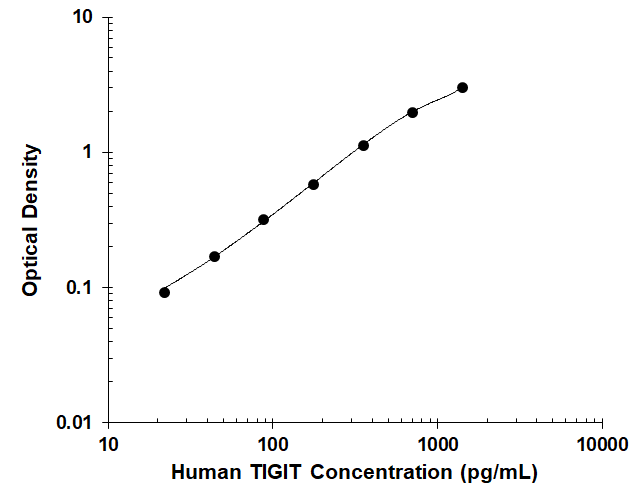TIGIT: ELISA Kits
TIGIT (T cell Immunoreceptor with Ig and ITIM domains), also called Vstm3, Vsig9, and WUCAM, is a transmembrane protein in the CD28 family of the Ig superfamily proteins. TIGIT is expressed on NK cells and subsets of activated, memory and regulatory T cells, and particularly on follicular helper T cells within secondary lymphoid organs. It binds to CD155/PVR/Necl-5 and Nectin-2/CD112/PVRL2 on dendritic cells (DC) and endothelium. Binding of TIGIT by DC induces IL-10 release and inhibits IL-12 production. Ligation of TIGIT on T cells downregulates TCR-mediated activation and subsequent proliferation, while NK cell TIGIT ligation blocks NK cell cytotoxicity. CD155 and Nectin-2 also interact with DNAM-1/CD226 and CD96/Tactile, and TIGIT binding to CD155 can antagonize the effects of DNAM-1. Soluble TIGIT is able to compete with DNAM-1 for CD155 binding and attenuates T cell responses, while mice lacking TIGIT show increased T cell responses and susceptibility to autoimmune challenges.
1 result for "TIGIT ELISA Kits" in Products
1 result for "TIGIT ELISA Kits" in Products
TIGIT: ELISA Kits
TIGIT (T cell Immunoreceptor with Ig and ITIM domains), also called Vstm3, Vsig9, and WUCAM, is a transmembrane protein in the CD28 family of the Ig superfamily proteins. TIGIT is expressed on NK cells and subsets of activated, memory and regulatory T cells, and particularly on follicular helper T cells within secondary lymphoid organs. It binds to CD155/PVR/Necl-5 and Nectin-2/CD112/PVRL2 on dendritic cells (DC) and endothelium. Binding of TIGIT by DC induces IL-10 release and inhibits IL-12 production. Ligation of TIGIT on T cells downregulates TCR-mediated activation and subsequent proliferation, while NK cell TIGIT ligation blocks NK cell cytotoxicity. CD155 and Nectin-2 also interact with DNAM-1/CD226 and CD96/Tactile, and TIGIT binding to CD155 can antagonize the effects of DNAM-1. Soluble TIGIT is able to compete with DNAM-1 for CD155 binding and attenuates T cell responses, while mice lacking TIGIT show increased T cell responses and susceptibility to autoimmune challenges.
| Assay Range: | 21.9 - 1,400 pg/mL |

